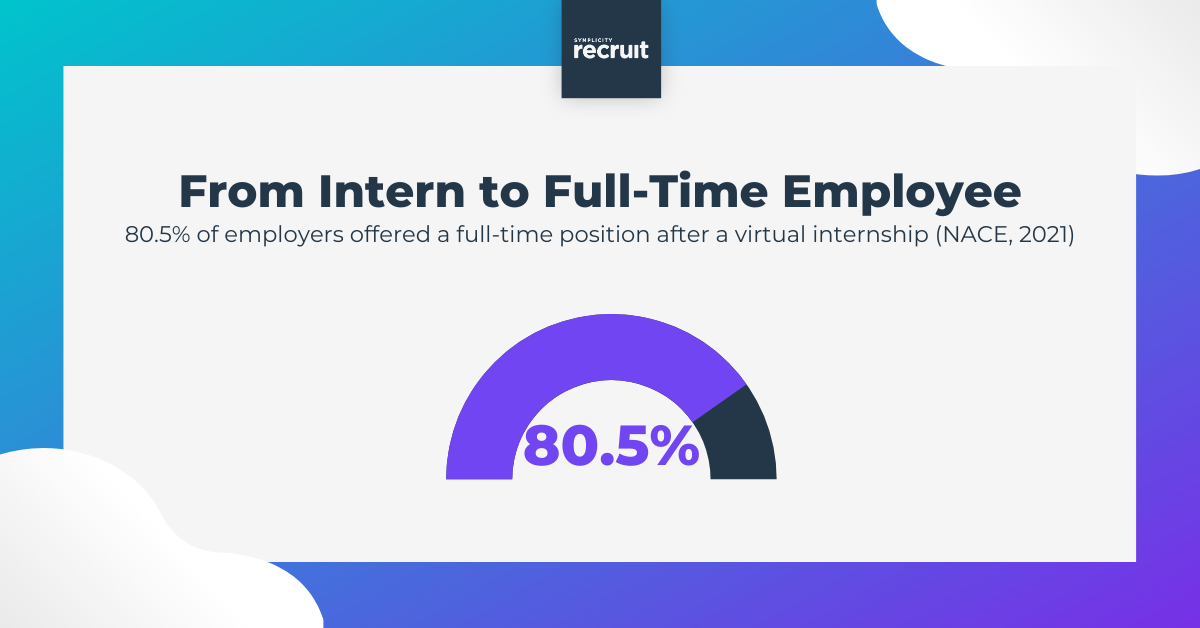It's no secret that the demand for interns is high, with some companies already in the race for interns for the 2025 season. Internships have historically been a great opportunity for companies to bring quality entry-level talent into an organization, making them vital to student and employer success. A 2022 report by the National Association of Colleges and Employers recently found that 68 percent of interns get a full-time offer from the company they interned for. Here's everything you need to know about how to convert interns into entry-level employees.
Benefits of Turning Interns Into Entry-Level Employees
- Fill Employment Gaps
There’s no better way to assess someone’s performance than working with them in advance of making a full-time offer. During an internship, the employer gets a chance to see for themselves what an intern’s work ethic, skills, and abilities, are, along with witnessing the overall fit of the candidate with the company. Think of the internship as a trial period before transitioning an intern into a full-time entry-level position. - Reduce Hiring Costs
External hires cost a company 18 percent more than promoting within the company. By hiring internally, employers are reducing costs and the time spent on recruiting activities. Transitioning interns into full-time entry-level positions is a cost-effective solution because it cuts down on entry-level recruiting costs and allows recruiters to focus their time on other sourcing strategies. - Boost Employee’s Productivity and Skills
Interns are eager to learn and are willing to take on simple administrative tasks away from senior staff members to focus more on strategic initiatives for the company. Moreover, as the newest employees, interns can be paired with mentors or supervisors who can show them the ropes of the job and teach them new skills. This is not only a great learning opportunity for interns, but also a chance for more tenured employees to showcase and develop their leadership and mentoring skills.
Setting Up Your Interns for Success and Transitioning Them Into Full-Time Employees

Because internships are temporary, to successfully convert interns into full-time entry-level employees, employers need to make sure that interns are receiving robust training opportunities and gaining new skills. By taking the time to train and develop an intern, companies are making sure interns gain real value from their role that they can offer to the employer upon graduation. The key here is to make sure interns feel included in day-to-day company activities, like:
- Real projects that make them accountable for their work;
- Company training sessions that make sense for their role; and
- Participation in company meetings, conferences, and events.
Offer mentorship Programs
Mentorship programs are a beneficial way to engage interns and provide them with insights about career opportunities, the ins and outs of how to navigate a company, and other guidance surrounding the role they’re in. Mentorship programs should be formalized to ensure every intern is aligned with the best-fit mentor to help them decide if they're choosing the right industries/jobs for themselves. Moreover, companies should budget for mentoring events and activities to encourage connectivity. Providing mentorships increases the likelihood that interns will receive the coaching required to grow and, ultimately, become better prospects for an entry-level position after graduation.
Provide Networking Opportunities
Networking opportunities are important for interns to expand their professional connections and broaden their industry knowledge. Both companies and interns benefit from attending networking events and having interns interact with company clients, vendors, and other professionals. This will allow interns to build professional relationships as they enter the workforce and allow them to start building a strong network within the company.
Don't Forget About Company Perks
Interns transitioning into full-time roles want to make sure that the benefits and perks a company offers align with the kinds of benefits they look for from an ideal position. Companies need to outline what the benefits package will look like with full-time employee status. As interns, benefits are often limited to learning and skill development, while as full-time employees, new hires are entitled to vacation, health and dental benefits, flex time, and any other benefits unique to the organization. When deciding on what perks will most appeal to entry-level candidates, make sure to consider what your competition offers entry-level hires as a benchmark to make sure your perks are enticing enough to woo candidates.
Maintain Communication and Stay Connected
An employer’s ability to stay connected with interns throughout the school year is important for maintaining the relationship and influencing the potential acceptance of an offer. It’s key for recruiters to incorporate ongoing communication with former interns into the entry-level recruiting strategy. Consider staying connected with both virtual and in-person meetings to acclimate interns to the team, as well as engaging interns to assist with recruiting activities on campus, as these are good ways to enhance brand enthusiasm.
Using Symplicity Recruit to Hire Interns
With Symplicity Recruit, Employers can engage with prime candidates from select schools. Every student in our network uses their school's career center to search for opportunities, ensuring that employers on Recruit are engaging with qualified, motivated candidates. Employers can choose to target specific institutions or promote opportunities throughout our entire network. Learn more about how Symplicity Recruit can help you fill internship and full-time entry level roles by scheduling a demo.